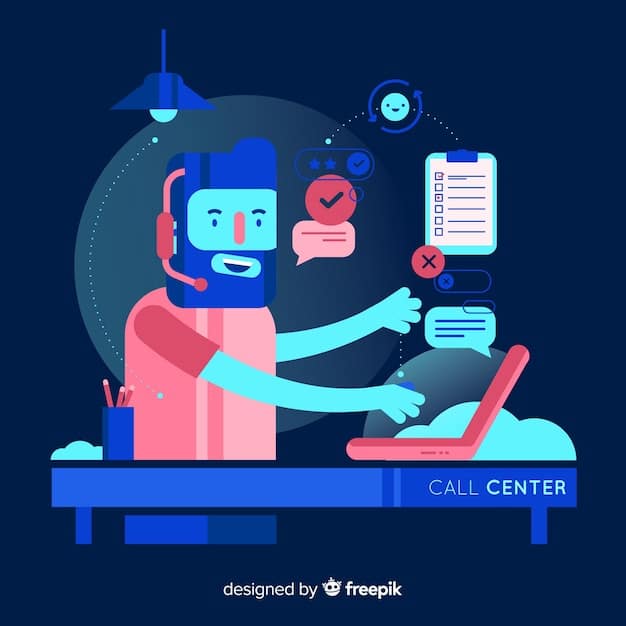AI Personal Assistants: What’s Next in the Next 12 Months?

Advertisements
The Rise of AI-Powered Personal Assistants: What to Expect in the Next 12 Months involves enhancements in natural language processing, greater personalization, expanded integrations with smart home devices and other services, and advancements in proactive assistance, leading to more intuitive and indispensable user experiences.
Get ready to experience the future, today. This article will explore the rise of AI-powered personal assistants: what to expect in the next 12 months, and how these intelligent systems are transforming the way we live, work, and interact with technology.
Advertisements
The Expanding Role of AI in Daily Life
AI-powered personal assistants have moved beyond simple voice commands. They are becoming increasingly sophisticated, learning our preferences, anticipating our needs, and seamlessly integrating into our daily routines. This evolution promises a future where technology anticipates our needs and simplifies our lives more than ever before.
Over the next year, we can expect these assistants to become even more deeply entwined with our daily lives, offering more personalized and proactive support. From managing our schedules and controlling our smart homes to providing real-time information and entertainment, AI assistants are poised to become indispensable tools.
Advertisements
Enhanced Natural Language Processing (NLP)
One of the key areas of advancement is in NLP, which enables AI assistants to better understand and respond to spoken and written language. This means fewer misunderstandings and more natural, fluid conversations.
Personalized User Experiences
AI assistants are becoming more adept at learning our individual preferences and tailoring their responses and recommendations accordingly. This personalization will make them even more useful and enjoyable to use.

The advancements in AI technology have propelled this evolution, creating assistants that are not only reactive but also proactive
- Improved accuracy in understanding complex commands and requests.
- Greater ability to handle nuanced language and recognize different dialects.
- More natural and human-like conversation styles that enhance user engagement.
In conclusion, the expanding role of AI in daily life is set to revolutionize how we interact with technology, offering personalized, intuitive, and seamless experiences that enhance our productivity and well-being.
Smarter Home Integration and Automation
AI-powered personal assistants are becoming increasingly integrated with smart home devices, enabling users to control lighting, temperature, entertainment systems, and more with simple voice commands. The next 12 months will see even greater strides in this area, with more seamless and intuitive automation capabilities.
Expect the ability to create complex routines and scenarios that automate multiple tasks simultaneously. For example, you could set up a “Good Morning” routine that turns on the lights, starts the coffee maker, plays your favorite music, and provides a weather update—all with a single command.
Increased Device Compatibility
AI assistants will support a wider range of smart home devices, making it easier to create a truly connected home ecosystem. This will include compatibility with newer and more specialized devices, such as smart appliances and advanced security systems.
Improved Energy Efficiency
AI assistants will be able to optimize energy consumption by learning your usage patterns and automatically adjusting settings to reduce waste. This can lead to significant cost savings and a smaller carbon footprint.
This can provide many advantages such as improving the automation and adding customized settings.
- Voice-controlled home security systems with facial recognition.
- Automated lighting and temperature adjustments based on occupancy and time of day.
- Smart appliances that can order groceries when supplies are running low.
In summary, smarter home integration and automation are set to transform our living spaces into more efficient, comfortable, and convenient environments, all controlled by the power of AI.
Proactive Assistance and Personalized Recommendations
AI-powered personal assistants are moving beyond simply responding to commands. They are becoming more proactive, anticipating our needs and offering personalized recommendations tailored to our individual preferences and habits. The next year will see a significant increase in this type of proactive assistance.
Imagine an assistant that reminds you to leave for an appointment based on real-time traffic conditions, suggests a new recipe based on your dietary restrictions and available ingredients, or recommends a book or movie based on your past viewing history.

Context-Aware Suggestions
AI assistants will use contextual information, such as your location, current activity, and upcoming events, to provide more relevant and timely suggestions. This will make them even more useful in helping you manage your day.
Learning and Adapting
AI assistants will continuously learn from your interactions and feedback, improving their ability to anticipate your needs and provide personalized recommendations over time. This will lead to a more seamless and intuitive user experience.
AI personal assistants will assist in proactive assistance and personalization.
- Travel recommendations based on past trips and preferences.
- Financial advice based on spending habits and savings goals.
- Health and wellness tips based on activity levels and sleep patterns.
In conclusion, proactive assistance and personalized recommendations are set to make AI assistants an integral part of our lives, providing support and guidance that helps us achieve our goals and live more fulfilling lives.
Advancements in Security and Privacy
As AI-powered personal assistants become more deeply integrated into our lives, security and privacy are paramount. The next 12 months will see significant advancements in these areas, with new technologies and protocols designed to protect user data and prevent unauthorized access.
Expect enhanced encryption methods to secure sensitive information, as well as stricter access controls to prevent unauthorized users from accessing your data. AI assistants will also become more transparent about how they collect and use your data, giving you greater control over your privacy settings.
Biometric Authentication
AI assistants will increasingly use biometric authentication methods, such as facial recognition and voice recognition, to verify your identity and prevent unauthorized access to your account.
Data Anonymization
AI assistants will anonymize user data to protect your privacy while still allowing them to personalize their services. This means that your data will be stripped of personally identifiable information before being used for analysis.
These advancements can improve data protection.
- End-to-end encryption for all voice and text communications.
- Regular security audits to identify and address potential vulnerabilities.
- User-friendly privacy dashboards that allow you to easily manage your data settings.
In summary, advancements in security and privacy are essential to building trust in AI-powered personal assistants, ensuring that users can enjoy the benefits of this technology without compromising their personal information.
The Impact on Various Industries
AI-powered personal assistants are poised to have a significant impact on a wide range of industries, from healthcare and education to retail and finance. The next year will see these assistants being adopted in new and innovative ways to improve efficiency, enhance customer service, and create new revenue streams.
In healthcare, AI assistants can help patients manage their medications, schedule appointments, and monitor their health conditions. In education, they can provide personalized learning experiences, answer student questions, and grade assignments. In retail, they can provide personalized shopping recommendations, process orders, and handle customer inquiries.
Healthcare
AI assistants will help patients manage their medications, schedule appointments, and monitor their health conditions.
Education
AI assistants will provide personalized learning experiences, answer student questions, and grade assignments.
AI personal assistants will be adapted in various industries.
- Virtual assistants for customer service that can handle a wide range of inquiries.
- AI-powered fraud detection systems that can identify and prevent fraudulent transactions.
- Personalized financial advisors that can help you manage your investments and plan for retirement.
In conclusion, the impact on various industries is set to be transformative, with AI assistants driving innovation, improving efficiency, and creating new opportunities for growth and development.
Challenges and Ethical Considerations
As AI-powered personal assistants become more prevalent, it is important to address the challenges and ethical considerations that arise. These include issues such as bias in algorithms, job displacement, and the potential for misuse of personal data. Over the next year, we can expect increased scrutiny of these issues and efforts to develop ethical guidelines and regulations.
It is crucial to ensure that AI assistants are developed and used in a way that is fair, transparent, and accountable. This requires addressing bias in algorithms, providing job training and support for workers who are displaced by automation, and implementing robust data privacy protections.
Bias in Algorithms
AI assistants can perpetuate and amplify existing biases if not carefully designed and trained. It is important to ensure that algorithms are fair and unbiased.
Job Displacement
The automation of tasks by AI assistants can lead to job displacement in certain industries. It is important to provide job training and support for workers who are affected.
There is the potential misuse of data.
- Developing ethical guidelines for the development and use of AI assistants.
- Implementing regulations to protect user data and prevent misuse.
- Promoting transparency and accountability in AI decision-making.
In summary, addressing the challenges and ethical considerations is essential to ensuring that AI-powered personal assistants are used in a way that benefits society as a whole, promoting fairness, transparency, and accountability.
| Key Point | Brief Description |
|---|---|
| 🤖 Enhanced NLP | Better understanding of spoken and written language for more natural conversations. |
| 🏠 Smarter Home | Seamless integration with smart devices for automated home management. |
| 🔮 Proactive Assistance | AI assistants anticipating needs and offering personalized recommendations. |
| 🔒 Security | Enhanced data protection with advanced encryption and biometric authentication. |
FAQ
▼
AI Assistants will likely use improved natural language processing to better understand and interpret spoken language and nuanced language.
▼
AI Assistants will work best with homes that work with smart devices. This includes lights, security systems, applianaces.
▼
AI Assistants will provide multiple features to secure the software such as face and voice recognition. These can improve authentication.
▼
AI Assistants are getting better. With more advances and new technologies available, this allows the software to do more.
▼
AI Assistants can greatly help patients manage medications, schedule appointments, and monitor health conditions. This frees up other resources.
Conclusion
In conclusion, the rise of AI-powered personal assistants is set to transform our lives in profound ways. With advancements in natural language processing, smarter home integration, proactive assistance, and enhanced security, these assistants will become indispensable tools for managing our daily routines, achieving our goals, and living more fulfilling lives. However, it is important to address the challenges and ethical considerations that arise to ensure that AI is used in a way that benefits society as a whole.